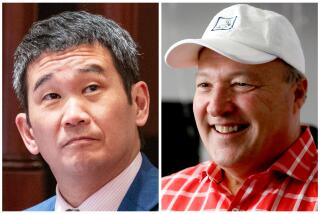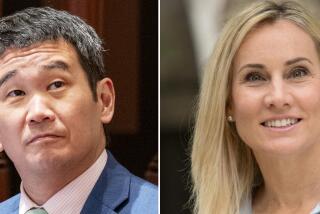Baugh Ordered to Trial Over ’95 O.C. Campaign
SANTA ANA — Assemblyman Scott R. Baugh was ordered Tuesday to stand trial on two felony and 10 misdemeanor charges arising from his first campaign for office in 1995.
Municipal Court Judge William L. Evans said there was “sufficient, reasonable probable cause” that the Huntington Beach Republican may be guilty of the allegations. These include felony charges that he lied on his campaign finance reports to conceal his link to a decoy Democrat candidate placed on the ballot by Republicans anxious to split the Democratic vote.
Evans had delayed making a final ruling in the case for a month in the hope that Baugh’s attorneys and county prosecutors could arrive at a plea bargain.
Although he had dismissed six of the charges against Baugh last month for lack of evidence, the judge on Tuesday rejected a defense motion that he dismiss the remaining 12 charges in the interest of justice.
Evans had used the threat of further dismissals to prod prosecutors into negotiating an end to the case without the need for a Superior Court trial.
Baugh, 35, who spoke freely after last month’s favorable ruling, waved off reporters and declined comment. He left the courtroom and the courthouse holding the hand of his wife, Wendy.
A former corporate attorney, Baugh has acknowledged that mistakes were made in his campaign, but he has insisted that he broke no laws, because he relied on the advice of others and acted in good faith.
Allan Stokke, Baugh’s lead attorney, said he would seek to have the charges dismissed in Superior Court, where Baugh is scheduled to appear for arraignment at 9 a.m. Jan. 5.
Stokke noted that “we did have some success” during the preliminary hearing, when Evans was persuaded to dismiss six of the 18 charges, including three felonies. “We now face a much smaller case, and a much weaker case,” he said.
Assistant Dist. Atty. John Conley said he was not surprised by the ruling: “This case is streamlined and simpler for a jury to understand. All the key counts are there.”
Baugh’s attorneys met with prosecutors several times during the past month, but the two sides were unable to agree on a plea bargain.
“We see it as more serious than they do, which is not surprising,” said Conley. He declined to discuss the talks but said prosecutors are seeking “very large fines”--but not state prison time.
Stokke declined comment.
If convicted of a felony, Baugh would lose his Assembly compensation and membership on committees, said Assembly Chief Clerk D. Dotson Wilson.
The Assembly could decide if he should be removed from office.
“Generally, members have resigned rather than be expelled from the Assembly for conviction of a felony,” he said.
As a lawyer, Baugh would also “face summary disbarment” for a felony conviction, said a spokeswoman for the State Bar.
If convicted of a misdemeanor, Baugh could not run for office for four years and could be disciplined by the State Bar.
Baugh was charged in October 1996 with five felony perjury counts and 13 misdemeanor violations of the Campaign Reform Act for allegedly falsifying five state-required financial disclosure forms related to his 1995 campaign.
The heart of the case has always been the prosecution’s contention that Baugh falsified several reports to hide from voters “his active involvement in placing decoy Democrat Laurie Campbell on the ballot to split the Democratic vote and help ensure his own victory over three other Republicans,” court papers state. The two felony charges and three of the misdemeanor charges relating to that allegation remain.
In addition, Baugh must stand trial on seven other charges, including allegations that he inflated the balance reported in his campaign account by lying about the dates he returned $27,000 in loans.
He is also accused of failing to deposit $11,000 in campaign funds to his campaign account, making a $6,000 campaign expenditure from his personal account and improperly using cash in his campaign, including accepting $8,800 in cash from a friend.
Baugh has characterized these failures as errors that were largely the result of bad advice from his campaign treasurer, Dan Traxler. He also has maintained that because he had no criminal intent, the case should be handled administratively by the state Fair Political Practices Commission, which oversees implementation of the Campaign Reform Act.
Evans’ ruling comes more than two years after the special election in the 67th Assembly District that recalled Republican Doris Allen and replaced her with Baugh, whose deciding vote elevated Assemblyman Curt Pringle (R-Garden Grove) to the post of Assembly speaker.
The election was so critical to the Republican leadership that GOP officials tried to limit the number of Republicans seeking to replace Allen and to recruit Democrats to split the opposition vote.
Four GOP aides, including two who worked on the Baugh campaign, have pleaded guilty to crimes related to their recruitment of Democrat Campbell, a longtime friend of Baugh’s, as a spoiler candidate in the race.
Baugh has denied any role in persuading Campbell to run.
Campbell’s role as a decoy candidate was exposed shortly after she filed to run. She admitted that she entered the race in part to help Baugh. Prosecutors contend that Baugh falsified several campaign reports to conceal a $1,000 campaign donation he had received from Campbell. Campbell had given Baugh the money a week before she entered the race.
Baugh returned that money in cash, then purposely left the contribution and its return in cash off several reports, prosecutors charge.
Stokke has said that Baugh was erroneously informed by his campaign treasurer that the contribution did not have to be reported because it had been returned.
Baugh corrected the error on a campaign report filed on election day, too late for the voters to learn about his connection to Campbell, prosecutors said.
Stokke argued that because Baugh was acting on the advice of Traxler, he lacked the specific intent to falsify that is required under a perjury statute.
More to Read
Sign up for Essential California
The most important California stories and recommendations in your inbox every morning.
You may occasionally receive promotional content from the Los Angeles Times.










